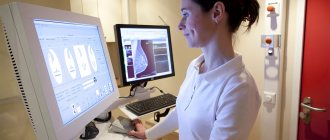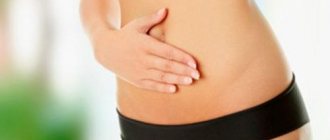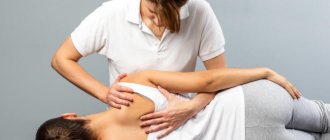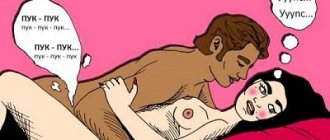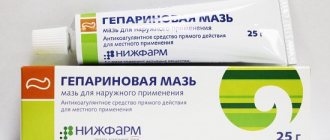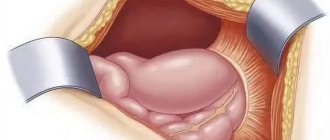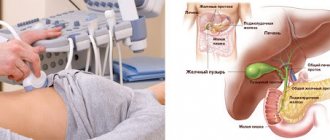intestinal infection
stomach ulcer
inflammation of the stomach
aneurysm
The appearance of noticeable tremors or pulsations in the abdomen is not a common condition for a person, and therefore causes anxiety and concern. In some cases, this symptom can be temporary and manifest itself under the influence of ordinary factors, but there are serious diseases, the characteristic manifestation of which is pulsation in the solar plexus area. If a characteristic pulsation occurs in the solar plexus or other areas of the abdomen, it is recommended to immediately seek medical help and undergo a comprehensive examination.
Possible reasons
Possible causes of pulsation in the abdomen include:
- Digestive disorders associated with poor nutrition, abuse of fatty and heavy foods, as well as exacerbation of chronic gastrointestinal diseases.
- Neoplasms in the abdominal organs.
- Food poisoning and intestinal infections.
- Increased gas formation in the intestines (flatulence).
- Diseases of the pancreas and biliary tract.
One of the causes of pulsation, dangerous not only to health, but also to life, is aortic aneurysm . The danger of the pathology lies in the high risk of vessel rupture in the enlarged area. Rupture of an abdominal aortic aneurysm is fatal.
If we talk about disorders of the gastrointestinal tract as a potential cause of the appearance of this symptom, then most often diseases such as chronic colitis, Crohn's disease, benign and malignant intestinal tumors lead to the appearance of pulsation. Pulsation in the lower abdomen also often signals the development of intestinal obstruction, when a person is additionally worried about chronic constipation and increased gas formation in the intestines.
When pregnancy occurs, periodic pulsation in the abdomen may be observed, associated with an increase in pressure in the abdominal cavity.
Only timely diagnosis allows taking measures to prevent severe complications. Additional (indirect) causes of pulsation in the abdomen include:
- increased physical activity;
- emotional overstrain, stress.
Pulsation in the abdominal area is a common sensation among people who are professionally involved in sports, especially athletics and weightlifting.
Useful video
If the pancreas hurts, this may indicate a disease.
To understand why pathologies of this organ are dangerous, you should know its main functions. Gland cells synthesize enzymes that are secreted into the duodenum in the form of digestive juice and promote the digestion of proteins, carbohydrates and lipids. An even more important function is the endocrine function. In special islets of pancreatic tissue, the hormones insulin and glucagon are formed, which regulate carbohydrate metabolism. Often the first signs of pancreatic pathologies go unnoticed, and lack of treatment can lead to irreversible changes in this important organ.
Diagnostics
If this symptom appears, you will need to consult several specialized medical specialists. Initially, it is recommended to consult a therapist, after which you may need to consult a gastroenterologist, infectious disease specialist, or surgeon.
A comprehensive diagnostic plan includes the following activities:
- Ultrasound examination of the abdominal organs and retroperitoneal space. Women may be prescribed an ultrasound of the pelvic organs.
- Colonoscopy or gastroduodenoscopy.
- Magnetic resonance imaging with and without contrast.
- Determination of estradiol and progesterone levels (in women).
- biochemical and general clinical blood test.
Prevention
The list of preventive measures depends on the etiological factors:
- With physiological provoking parameters, regular rest, nutritional control, and reduced physical activity are sufficient. Stressful situations and severe nervous tension should be avoided.
- If you have high acidity, it is recommended to take medications that reduce the secretion of gastric acid, such as Gastal. Espumisan is prescribed in the complex to reduce bloating.
- For digestive disorders, Creon is prescribed.
An effective preventive measure is a moderate diet with the temporary exclusion of fried, spicy, and fatty foods. Poor nutrition can cause discomfort such as pain in the upper abdomen.
Pulsations in the stomach are a harmless symptom or sign of stomach diseases
Your stomach becomes swollen - so much so that it hurts to touch. Many patients with pancreatitis often complain of a swollen or distended abdomen. The extra fluid moving around in the body causes the abdomen to swell and the skin over the area to become very tight. Fluid builds up and patients may feel excessive pressure on the abdomen.
Treatment
Author: Pashkov M.K. Content Project Coordinator.
Every person has had pain under the left rib at least once in their life. Have you ever thought about the causes of this pain? But this is a clear signal from the endocrine system, which is responsible for fermentation during the digestion of food. Pain symptoms especially increase after eating fatty and high-calorie foods. While the endocrine system balances hormonal stability through alpha and beta cells, the extrinsic function is responsible for acid secretions. That's why we experience discomfort, sometimes even heartburn.
Warning signs
Pulsations usually indicate an aortic aneurysm - the most dangerous condition for this symptom. You can recognize it by the following additional symptoms:
- cramping pain that does not stop and is located just to the left of the navel;
- feeling of fullness even with minimal food intake;
- tingling feeling;
- pale skin on the legs is evidence of insufficient blood supply;
- Sensory impairment (in rare cases).
For an aneurysm up to 5 cm, doctors use conservative treatment methods; if the pathology has reached a larger size, they resort to surgery.
Therapy
Treatment of viral hepatitis is carried out exclusively in the infectious diseases department.
One of the important points of treatment is dietary nutrition (table No. 5). It involves limiting salt intake. The patient is recommended to eat light meals, split meals in small portions. Fast food, spicy, fatty, fried foods are excluded from the diet. Recommended are pureed soups, jelly, low-fat dairy products, steamed fish and chicken cutlets, soft-boiled eggs, and vegetables. Baked vegetables are especially beneficial
with a high fiber content.
Drug therapy may include:
- diuretics, ACE inhibitors necessary for the treatment of cardiac pathology;
- antibacterial agents;
- detoxification by infusion method;
- enzyme preparations;
- antispasmodics;
- enterosorbents;
- probiotics;
- non-steroidal anti-inflammatory drugs;
- choleretics that stimulate bile production;
- herbal medicine (decoction of dandelion, chamomile, valerian);
- hepatoprotectors.
Among physiotherapeutic procedures, we focus on reflexology, electrophoresis, and mud therapy.
For echinococcosis, surgical intervention can be performed after a course of taking Mebendazole. The drug is prescribed to inhibit the proliferation of parasites, reduce the volume of cysts, and also reduce the risk of relapse. After removing the formation, germicides are introduced into the cavity.
Removal of the gallbladder is performed in the calculous form of the disease.
Treatment of pain in the navel area
An enema can only be used after consultation with a doctor.
For any prolonged or recurring abdominal pain, it is important to consult a specialist as soon as possible and follow all his recommendations.
It is unacceptable to take painkillers on your own - they blur the clinical picture and do not allow you to accurately diagnose the disease.
This leads to delays in treatment and deterioration of well-being. It is strictly forbidden to apply a warm heating pad to the stomach - in case of appendicitis, it helps to accelerate the process and the development of peritonitis.
If inflammatory processes in the intestines are detected, the doctor will prescribe antibacterial drugs and also prescribe a diet that will help the intestines recover faster. The patient is prescribed to drink plenty of fluids, while any carbonated drinks and alcohol are completely excluded from the diet.
Spicy, fatty, smoked, fried foods are also excluded; the basis of the diet is the most easily digestible food. When treating intestinal diseases, split meals are prescribed: food is taken in small portions 5-6 times a day to reduce the load on the stomach and intestines.
If you follow the specialist’s recommendations, your health will improve within a few days, but you must follow the prescribed regimen until the end of treatment. Any folk remedies: tinctures, herbal decoctions, enemas, etc. can be used only after consultation with a doctor. Even if they do not cause harm, they may be ineffective, delaying the provision of real help.
Any inflammatory process in the digestive tract can become chronic, which will lead to a deterioration in the patient’s quality of life.
Discomfort in the suprapubic area
Pain in the lower abdomen in the center in men can be a symptom of diseases in the urinary tract and bladder. The intensity of the sensations is low, but urination is accompanied by burning and spasms. Blood in the urine, nausea and general intoxication may occur. Cystitis and bladder stones give this picture. Both conditions require seeing a doctor and prescribing adequate therapy.
Exacerbation of prostatitis also manifests itself as discomfort in the lower abdomen. The pain may increase with miction or ejaculation. There are acute prostatitis caused by a bacterial infection and chronic. Both conditions require the participation of a urologist.
The cause of pain in the lower abdomen in a man can be an infectious process or inflammation of the testicles. The condition is triggered by injury or sexually transmitted diseases. If, in addition to pain, compaction in the testicles, discharge from the penis, or changes in the skin are observed, an urgent consultation with a doctor is needed.
Pain in the navel area due to diseases of the small intestine
Pain can be associated with very dangerous conditions that threaten the patient’s life.
Very often, pain near the navel occurs due to diseases of the small intestine: they occur both above the navel and in the area below it, depending on the existing pathology.
Pain can be associated with very dangerous conditions that threaten the patient’s life.
Cramping pain appears around the navel with obstruction of the small intestine - it occurs under the influence of mechanical reasons, or when compressed due to adhesions or volvulus. Severe pain is accompanied by repeated vomiting; it does not lead to improvement.
There is no gas or diarrhea. If measures are not taken in a timely manner, the pain may disappear, but subsequently a state of shock develops with a sharp drop in blood pressure. Without urgent surgical intervention, the patient will die, so it is necessary to urgently take him to the hospital.
Another cause of pain can be chronic jejunitis - inflammation of the jejunum. Pain occurs in the umbilical region, with flatulence and repeated diarrhea occurring up to 20 times a day. The stool becomes foamy and acquires an unpleasant odor. The inflammatory process develops gradually, so it is important to start treatment as quickly as possible.

